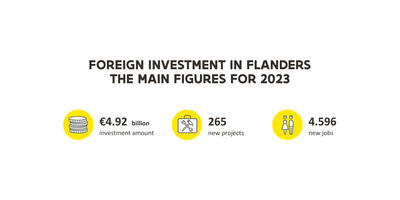
Preparing for the future by shaping it: SIM leads the way in materials science
Founded back in 2009 by some of the most renowned players in Flanders’ materials industry and the region’s universities, SIM became one of the region’s official spearhead clusters in 2017.
The ‘Yes, together we can’ attitude at SIM“Together, we can: |
Materializing impact for society and industry
“If you consider just about any major challenge we will have to face over the next decade, materials are at the center of it,” Guido explains. “To improve energy management and reduce negative impacts on the climate, we need more efficient electrical engines, solar panels, wind turbines and batteries, for instance. On the other hand, for materials prone to supply disruptions – like rare earth elements –, we need to find alternatives. Even in the development of solutions to the aging population dilemma and its costs, materials take center stage. Think about wearables that detect vital signs, or smart carpets in retirement homes that can alert nursing staff when an elderly person falls.”
The way we are structured and use research talent allows SIM to keep up with the ever increasing speed of evolution in our environment.
Lean, mean materials machine
Traditionally, the materials innovation process has been slow and expensive. Developing and commercializing a new material can take up to 15 years and cost millions. SIM’s goal is to speed up the go-to-market process. Guido: “By working together with the entire value chain – from raw material suppliers to end users –, we can maximize inputs and knowledge and bring into use new or enhanced materials much quicker. Start-ups and SMEs are often eager to test innovations – giving all of us the chance to learn how to improve further.”
“To give just one example, we’ve been working on lightweight composites and their stiffness and fracture behavior,” Guido continues. “Two researchers working on the project have created a new company, REIN4CED, which further developed and patented a specific material. Soon, they will start selling bicycle frames that offer cyclists maximum safety and durability. In a later stage, the focus will extend to automotive and aerospace.”
Our goal is to maximize inputs and knowledge for development of new or enhanced materials and speed up the go-to-market process.
Laser focus on added value
To utilize the expertise of its member companies and partner organizations to the fullest, SIM set a carefully considered program structure in place. Guido: “Instead of having a multitude of projects all going in different directions, we focus on research programs consisting of several projects within clear-cut themes. There is, for example, the MARES program, where our goal is to recover metal out of waste material and turn the residues into building materials. Another one is the SOPPOM program, where we produce nanomaterials and print these into functional components such as (NFC) tags and solar modules.”
“While this approach helps maintain our focus and enables us build upon earlier results,” Guido adds, “we also recognize that it can be restrictive. That’s why we also launch stand-alone projects if there’s enough critical mass and a clear benefit for society and business. Most of these revolve around the circular economy, energy and industry 4.0.”

A concrete role in making sustainability happen
Materials science is an endlessly fascinating domain and an important path toward revolutionizing the way we build, manufacture, recycle and more. Guido: “Climate change may well be the biggest challenge we’re facing today, so it’s our priority to help find solutions. We are determined to contribute to tomorrow’s sustainable society.”
Cluster ID
|
SIM members in the spotlight
|


